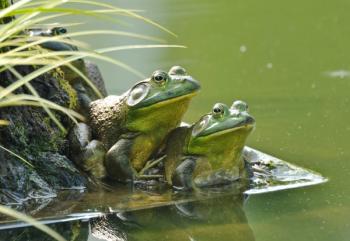
Divisive Tribalism Worsens the Mental Health Impact of the Climate Emergency
How does divisive tribalism handicap our efforts to solve the climate emergency?
COMMENTARY
It is now widely documented that the growing climate emergency is having an increasingly negative impact on our mental health. As difficult as the climate emergency is to solve, however, it is divisive tribalism that is truly making it harder.
Some basic definitions are important here. As defined by Merriam-Webster Dictionary, a tribe is “a group of persons having a common character, occupation, language and/or interest.”1 Tribalism is “tribal consciousness and loyalty, especially exaltation of the tribe above other groups.”2 Divisive tribalism adds to that definition diminishment of other groups and conflicts regarding language, identity, and beliefs.
Literature into the nature of tribalism ranges from “Tribalism is Human Nature”3 to “The Myth of Tribalism.”4 As quoted by Dominic Packer and Jay Van Bavel4:
“What many people call tribalism is not inevitable; rather, it’s a function of group norms. But the constant invocation of tribalism may create a self-fulfilling prophecy; people come to distrust other groups and falsely believe they need to discriminate against outsiders or suppress dissenters to maintain their status within their own group.”
There are 5 principal manifestations of divisive tribalism that handicap solving the climate emergency:
- The polarization in political parties in the United States and many other countries that has become extreme, severely limiting constructive dialogues to discuss and implement solutions.5
- Conflict between those who believe that solutions for the climate emergency should be implemented where someone else lives (“not in my back yard,” or NIMBY), and those who believe that since the climate emergency is a global problem, solutions must be implemented globally as well.6
- Conflict between scientifically minded individuals and non-scientifically minded individuals. Scientists understand that science is never exact, never final, and always open to question, evolution, revision, and other changes. Those who are not scientifically minded, or who are actively anti-science, incorporate the uncertainties and evolution of science as evidence of its inaccuracy and corruption.7
- Conflict between economists and non-economists. Economists believe that there are many reasons to spend money, including investment in a future project, and many different causes of inflation. Non-economists sharply disagree, believing that all government spending is wasteful, frivolous, and the cause of inflation.8
- Conflict between corporate interests and social (or public) interests. As Daniel Bernstein, MD, has alluded, the fossil fuel industry—like the tobacco industry—has deliberately created strategies to make the individuals who use their products more addicted.9 He may just as well have pointed out that what motivates the corporate oligarchs of the fossil fuel industry is, likewise, addiction. They would rather have their “fix” of ever more obscene profits, even at the cost of the futures of their own children and grandchildren.10
The emotionally charged conflict in these areas can block constructive dialogue and reparative action. As clinicians, we must have the freedom and feel the duty to alert our patients and other members of our communities about the dangers that divisive tribalism represents in effectively confronting the climate emergency.
Documentarian Ken Burns said it best when director Steven Spielberg was interviewing him regarding Burns’ documentary, The U.S. and the Holocaust: “Steven, there is only ‘us.’ Anyone who thinks there is a ‘them’ is in serious trouble.”11
And so we are, and we must act! We must follow the lead of Ayman Odeh, an Arab Palestinian citizen of Israel and a member of the Knesset who wrote recently in the New York Times12:
“A nation is defined as a group of people with a common language, a common past, and common dreams. By this definition, any parent will tell you that all the world’s babies are children of a single nation. They have a common language, a common past, common dreams. They speak the same, get angry and cry at the same things, laugh the same way. When my 3 children were young, I marveled at how they communicated effortlessly with other babies, no matter the language of the lullabies their parents sang them at night. The whole of this nation of infants wants just 1 thing: to grow up to a good life. It’s a simple dream. Our role as leaders is simple too: to make that possible.”
Let us do exactly that.
Note: The opinions expressed in commentaries are those of the authors and do not necessarily reflect the opinions of Psychiatric Times®.
Dr Kalm is a psychiatrist who practices in Salt Lake City, Utah. He is a clinical assistant professor of psychiatry at the University of Utah and public affairs representative of the Utah Psychiatric Association.
References
1. Tribe. Cambridge Dictionary. Accessed January 20, 2024.
2. Tribalism. Merriam-Webster. Updated February 5, 2024. Accessed January 20, 2024.
3. Clark CJ, Liu BS, Winegard BM, Ditto PH.
4. Packer D, Van Bavel J. The myth of tribalism. The Atlantic. January 3, 2022. January 20, 2024.
5.
6. Cui L, Chen Y, Wang X, Liu S.
7. Funk C, Alper BA.
8. Oreskes N, Conway EM.
9. Bernstein D. ‘Fossil fuel use disorder’ is killing us. Psychiatric News. September 8, 2023. Accessed January 20, 2024.
10. Freudenberg N. Corporations, conflicts of interest and protecting public health. Corporations and Health Watch. November 1, 2017. Accessed January 20, 2024.
11. Ken Burns and Steven Spielberg discuss The U.S. and the Holocaust. PBS. Accessed January 20, 2024.
12. Odeh A. What it takes to choose life over revenge. New York Times. October 19, 2023. Accessed January 20, 2024.
Newsletter
Receive trusted psychiatric news, expert analysis, and clinical insights — subscribe today to support your practice and your patients.







